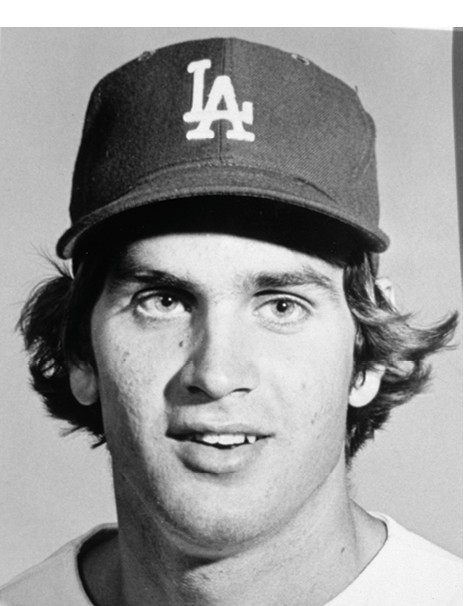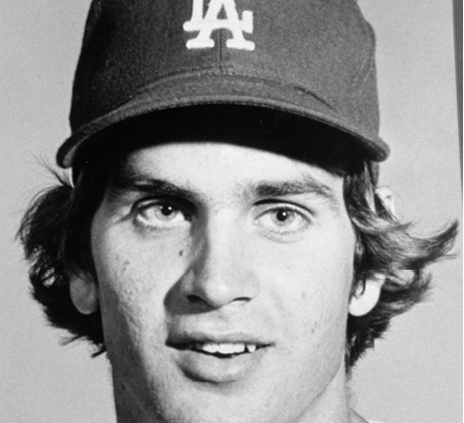October 11, 1978: In dramatic ninth inning, Bob Welch strikes out Reggie Jackson to secure Dodgers’ win in Game 2

Right-hander Bob Welch pitched 10 years for the Dodgers and struck out Reggie Jackson to end Game Two of the 1978 World Series. (SABR-Rucker Archive)
The path to the 1978 World Series was not an easy one for the Los Angeles Dodgers, and there was speculation that an August 20 clubhouse brawl might hurt their postseason chances. In the well-publicized incident, star first baseman Steve Garvey and standout starting pitcher and future Hall of Famer Don Sutton ended up on the Shea Stadium clubhouse floor in a dispute over remarks Sutton had made to Washington Post sportswriter Tom Boswell. According to published reports, Sutton claimed Reggie Smith was the team’s best player while taking a shot at Garvey and his Golden Boy image. The wrestling bout left both players with scratches and bruises.1
The Dodgers won the August 20 contest with the New York Mets and actually widened their division lead over the San Francisco Giants. Sutton apologized a few days later and it seemed the Dodgers may have dodged a bullet. But at least one writer thought the fight showed division on the team that could only help the Cincinnati Reds and the Giants, the Dodgers’ closest division rivals.2
But the team remained focused and won the National League West championship by 2½ games over the Reds. In fact, in the month after the “Grapple in the Big Apple,” the Dodgers won 22 games while losing only 11 and on September 16 led the division by nine games. They clinched on September 24.3 After the Dodgers clinched the division title behind Bob Welch, they turned to the National League Championship Series, where they defeated the Philadelphia Phillies three games to one. It took an unearned run in the 10th inning for the Dodgers to prevail in Game Four at Dodger Stadium on October 7 and send them to the World Series.
In a repeat of the 1977 World Series, the 1978 Series matched the Dodgers and the New York Yankees. In the first game, on October 10, the Dodgers defeated the Yankees, 11-5. Two home runs by Davey Lopes and another by Dusty Baker led the LA attack. Pitcher Tommy John earned the victory for the Dodgers but he did surrender a solo home run to Reggie Jackson.
But before the Dodgers could take the field for Game Two, the team and all of baseball paused to honor longtime Brooklyn and LA Dodger player and coach Jim Gilliam. Gilliam suffered a stroke and lapsed into a coma on September 15. He never emerged from the coma and died on October 8 at the age of 49. Gilliam broke in with the Brooklyn Dodgers in 1953 and earned National League Rookie of the Year honors after batting .278 with a .383 on-base percentage. After being a player-coach in 1965 and 1966, Gilliam became a full-time coach in 1967.4
Gilliam’s funeral was the morning of October 11, just hours before the second game of the World Series. It was undoubtedly an emotional and inspiring moment for the Dodgers. Tommy Lasorda, who had just completed his second full season as manager, delivered one of the eulogies.5 The Dodgers had dedicated the National League pennant to Gilliam.
Several hours after the funeral, the team took the field at Dodger Stadium for Game Two. Jim “Catfish” Hunter started for the Yankees and Burt Hooton got the call for the Dodgers.
In the top of the first inning, the Dodgers avoided a potential Yankees run when catcher Steve Yeager threw out center fielder Gary Thomasson trying to steal second. Yankee catcher Thurman Munson followed with a double – a harmless double as it turned out as the bases were empty. Designated hitter Reggie Jackson then struck out to end the Yankee first.
The Dodgers would not be as fortunate in the third inning. Jackson came to the plate after left fielder Roy White singled and stole second, and Munson walked. Jackson’s double to right brought both runners home and the Yankees were up 2-0. In the bottom of the fourth, the Dodgers cut New York’s lead in half as right fielder Reggie Smith reached on a fielder’s choice, moved to second on Garvey’s single, and made it home on third baseman Ron Cey’s base hit to center field.
As it turned out, Cey was just getting started. Second baseman Lopes opened the bottom of the sixth inning with a single, and another single by Smith put runners at the corners. After Garvey fouled out, Cey lined a Hunter pitch into the left-field bleachers to give the Dodgers a 4-2 lead.
Jackson was not quite finished, either. White got his second single of the night to start the Yankees seventh. A pitching change brought in Terry Forster to replace Hooton. Forster was greeted with a double by pinch-hitter Paul Blair that sent White to third. After Munson struck out, Jackson grounded out second to first. But White raced home on the play and Jackson had his third RBI of the game.
The Yankees got no more runs in the seventh or eighth innings off Forster, and Goose Gossage, in relief of Hunter, retired the Dodgers in order in the seventh and eighth. The game entered the final frame with the Dodgers clinging to a 4-3 lead.
Bucky Dent, whose homer in a tiebreaker game against the Boston Red Sox was instrumental in getting the Yankees to the World Series, started the ninth inning with a single to left field. White grounded out pitcher to first on a play that put Dent, the tying run, in scoring position. A walk to Blair by Forster brought Lasorda to the mound. The skipper changed pitchers and brought in rookie Bob Welch to try to hold the Dodgers’ slim lead. Welch, the Dodgers’ first-round draft pick in 1977, induced Munson to fly out to right. With two out, the capacity crowd of 55,982 roared as Jackson approached the plate.
The Yankees were down to their final out. There was no exaggerating the importance of the matchup – Welch, the untested rookie, against Jackson, the veteran slugger. “The Babe of Summer,” as one writer labeled him,6 against Mr. October, who had earned his title with three home runs in the final game of the 1977 World Series.
Nine pitches, nothing but fastballs, Welch later recalled.7 Welch’s first five offerings were a swinging strike, a ball high inside, and three straight fouls. A ball outside, another foul, and another ball outside and the count was full at 3-and-2. One last fastball, a giant swing and a miss by Jackson, and the game was over.
Welch earned a new nickname after the encounter, The Iceman.8 For his part, a frustrated Jackson could only be philosophical. “I battled him as long and as hard as I could,” he said of Welch. “He beat me. The ball was up and in. It was good pitching. If he had got it out over the plate, I would have gotten him.”9
As United Press International sports editor Milton Richman put it: “When the dust had settled, it was the Dodger rookie who was standing there triumphantly in the middle of the street with his gun still smoking and the mighty Reggie Jackson lying wounded on the ground.”10 The Dodgers owned a 2-0 Series lead with the action switching from Dodger Stadium to New York.
Sources
In addition to the sources cited in the Notes, the author consulted Baseball-Reference.com and Retrosheet.org.
https://www.baseball-reference.com/boxes/LAN/LAN197810110.shtml
https://www.retrosheet.org/boxesetc/1978/B10110LAN1978.htm
Notes
1 Scott Ostler, “Suddenly, the Hugging Turns to Punching,” Los Angeles Times, August 21, 1978: 32. Sutton’s entire quote, as republished in the Los Angeles Times was as follows: “This nation gets infatuated with a few names. All you hear about on our team is Steve Garvey, the All-American boy. Well, the best player on this team for the last two years – and we all know it is – is Reggie Smith. As Reggie goes, so goes us. Reggie doesn’t go out and publicize himself. He doesn’t smile at the right people or say the right things. He tells the truth, even if it sometimes alienates people. Reggie is not a façade or a Madison Avenue image. Reggie and Richie Allen are the two most totally misrepresented players I ever met. They’re wonderful people with wrong reputations.”
2 Marc Maturo, “Dodger Blue Turns Red During ‘Family’ Scrap,” White Plains (New York) Reporter Dispatch, August 21, 1978: 25.
3 Gordon Verrell, “Garvey-Sutton Tussle Ignited Dodger Express,” The Sporting News, October 14, 1978: 35.
4 “Dodger Coach Jim Gilliam Dies,” Modesto (California) Bee, October 9, 1978: 17.
5 “More Than 2,000 Attend Gilliam Funeral, Los Angeles Times, October 12, 1978: 67.
6 Ross Newhan, “Cey Magnifique and So Is Welch,” Los Angeles Times, October 12, 1978: 54.
7 Milton Richman, “Welch’s 11 Pitches Frustrate Yankees,” Buffalo Evening News, October 12, 1978: 6.
8 Ostler, 32.
9 Hal Bodley, “Rookie Reliever Welch Strikes Out Jackson with Two on in Ninth to Wrap Up 4-3 Win,” Battle Creek (Michigan) Enquirer, October 12, 1978: 19.
10 Richman.
Additional Stats
Los Angeles Dodgers 4
New York Yankees 3
Game 2, WS
Dodger Stadium
Los Angeles, CA
Box Score + PBP:
Corrections? Additions?
If you can help us improve this game story, contact us.


